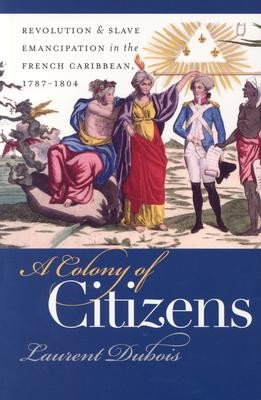| A Colony of Citizens: Revolution and Slave Emancipation in the French Caribbean, 1787-1804 Contributor(s): DuBois, Laurent (Author) |
|
 |
ISBN: 0807855367 ISBN-13: 9780807855362 Publisher: Omohundro Institute and Unc Press OUR PRICE: $45.13 Product Type: Paperback - Other Formats Published: March 2004 Annotation: The idea of universal rights is often understood as the product of Europe, but as Laurent Dubois demonstrates, it was profoundly shaped by the struggle over slavery and citizenship in the French Caribbean. Dubois examines this Caribbean revolution by focusing on Guadeloupe, where, in the early 1790s, insurgents on the island fought for equality and freedom and formed alliances with besieged Republicans. In 1794, slavery was abolished throughout the French Empire, ushering in a new colonial order in which all people, regardless of race, were entitled to the same rights. But French administrators on the island combined emancipation with new forms of coercion and racial exclusion, even as newly freed slaves struggled for a fuller freedom. In 1802, the experiment in emancipation was reversed and slavery was brutally reestablished, though rebels in Saint-Domingue avoided the same fate by defeating the French and creating an independent Haiti. The political culture of republicanism, Dubois argues, was transformed through this transcultural and transatlantic struggle for liberty and citizenship. The slaves-turned-citizens of the French Caribbean expanded the political possibilities of the Enlightenment by giving new and radical content to the idea of universal rights. |
| Additional Information |
| BISAC Categories: - History | Caribbean & West Indies - General - Social Science | Ethnic Studies - African American Studies - Social Science | Slavery |
| Dewey: 326.809 |
| LCCN: 2003019519 |
| Series: Published by the Omohundro Institute of Early American Histo |
| Physical Information: 1.09" H x 6.3" W x 9.38" (1.45 lbs) 472 pages |
| Themes: - Cultural Region - Caribbean & West Indies - Ethnic Orientation - African American |
| Descriptions, Reviews, Etc. |
| Publisher Description: The idea of universal rights is often understood as the product of Europe, but as Laurent Dubois demonstrates, it was profoundly shaped by the struggle over slavery and citizenship in the French Caribbean. Dubois examines this Caribbean revolution by focusing on Guadeloupe, where, in the early 1790s, insurgents on the island fought for equality and freedom and formed alliances with besieged Republicans. In 1794, slavery was abolished throughout the French Empire, ushering in a new colonial order in which all people, regardless of race, were entitled to the same rights. But French administrators on the island combined emancipation with new forms of coercion and racial exclusion, even as newly freed slaves struggled for a fuller freedom. In 1802, the experiment in emancipation was reversed and slavery was brutally reestablished, though rebels in Saint-Domingue avoided the same fate by defeating the French and creating an independent Haiti. The political culture of republicanism, Dubois argues, was transformed through this transcultural and transatlantic struggle for liberty and citizenship. The slaves-turned-citizens of the French Caribbean expanded the political possibilities of the Enlightenment by giving new and radical content to the idea of universal rights. |
Contributor Bio(s): DuBois, Laurent: - Laurent Dubois is professor of history and Romance studies at Duke University. He is author of Les esclaves de la Republique: l'histoire oubliee de la premiere emancipation, 1789-1794.Dubois, Laurent: - Laurent Dubois is professor of history and Romance studies at Duke University. He is author of Les esclaves de la Republique: l'histoire oubliee de la premiere emancipation, 1789-1794. |